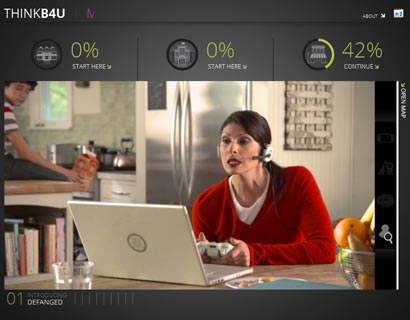
Google has launched the Web site THINKB4U to promote safe and responsible online habits by teaching parents, educators and kids who haven't yet reached the "I know
it all" stage that what posts on the Internet lives on forever.
Developed with support from the creative team at digital agency Fuel, the content and site examine nine key areas: Share,
Multi-Task, Respond, Act, Buy, Search, Send, Step, and Text through interactive video content, HTML 5 features, and a choose-your-own-adventure-style theme. The areas were developed in partnership
with Google's online safety partners ConnectSafely, Common Sense Media and the National Consumers League.
One video reminds us through a conversation by two young teenagers that anything
posted online lives on, and that anything publicly posted can be read by all. In an ice cream shop, the two pull out their mobile phones and query their name on a search engine. The engine returns
derogatory statements and posts for each. And in a game played between the two, each statement creates a negative mark on their tally, which serves as a reminder that one day a future employer might
see the post.
advertisement
advertisement
The content follows a typical American family through its daily activities on the Internet to illustrate the dos and don'ts, as well as the consequences of online
communication. There are nine videos that take place within three environments: Home, School and Mall; and education streams are navigable by Parents, Students and Educators.
The nine key
areas are outlined in each section -- Parents, Students and Educators -- each with stats and tools designed to inform and teach how to best manage digital life online. For Parents and
Students there are tips and links to more information from Google's partners. For Educators, tips are supported with lesson plans.
Fuel worked with Google Labs and its partners to build out
the project, according to Jeff Roach, chief strategy officer at Fuel. The group initially got started in Q4 2011, and the site went live in February.
The site also has downloadable lesson
plans that can help teachers convey the messages in a way that even most teenagers will understand.
Parents need to educate themselves in order to teach their kids. Brands can become the
parents' advocates through sponsored ads. Just telling or forbidding kids not to go on specific sites is not enough. Parents must set limits, learn the popular sites kids visit, and visit them too.
They need to teach kids that it's not all about instant gratification. It's about stopping and thinking before posting. Believe it or not, some adults do it, too. Publishers get a lot of requests
to take down a comment after someone clicked the post button in haste.
Meanwhile, On Thursday, Google also launched a consumer
survey paywall for publishers where questions to answers become the token that opens the door and releases the content. Publisher partners at launch include Pandora, the Christian Science
Monitor, and the New York Daily News. Lucky Brand Jeans, Tumbk2, and King Arthur were testers, too.